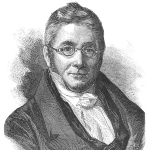Alphonse Louis Pierre Pyrame de Candolle was a French botanist. He introduced new methods of investigation and analysis to phytogeography, a branch of biology that deals with the geographic distribution of plants.
Background
Candolle was born on October 28, 1806, in Paris, France, the son of the Swiss botanist Augustin-Pyramus de Candolle and Fanny Torros. He spent the first years of his life at Paris, then at Montpellier, where Ills father taught at the university.
Education
In 1816 Candolle went to Geneva, where he followed a classical curriculum and, in 1825, received a bachelor’s degree in science. In spite of his devotion to botany, he turned to the study of jurisprudence, earning his doctorate in law in 1829.
Career
Under the guidance of his father, Candolle continued his research in taxonomy and became honorary professor at the Geneva Academy in 1831. In 1835 he succeeded his father in the chair of botany at the university and in the directorship of the botanical gardens. In the same year Candolle published his standard botanical text, Introduction à l’étude de la botanique, which was translated into German and Russian.
By 1850 he had given up teaching to concentrate on research. Candolle did not forget his training in law, and took part in the public life of the city. He was responsible for the introduction of postage stamps into Switzerland. In 1866, however, he withdrew completely from public affairs. Besides his interest in politics, Candolle was passionately devoted to the history of science and in 1873 published a remarkable book, Histoire des sciences et des savants depuis deux siècles. The book displays both the naturalist’s objectivity and the jurist’s clarity. Darwin had just published his own works when Candolle wrote the Histoire; and Candolle was enthusiastic over the thesis of natural selection, which he applied with keen intelligence to the moral and intellectual characteristics of man and of human societies. Besides his research he carried on the publication of the Prodromus, a vast treatise on phytotaxonomy begun by his father in 1824. Mention should also be made of Origine des plantes cultivées (1882). Most of Candolle’s numerous publications are monographs dealing with important plant families.
Until his death Candolle maintained his interest in the learned societies of his country, especially the Société Helvétique des Sciences Naturelles, the oldest of the itinerant associations in Europe. His personal library and herbarium, in the family residence in the Cour St. Pierre, was a “sanctuary” of botany, where numerous researchers from all over the world came to submit their work and to discuss their ideas with the Genevan master.










